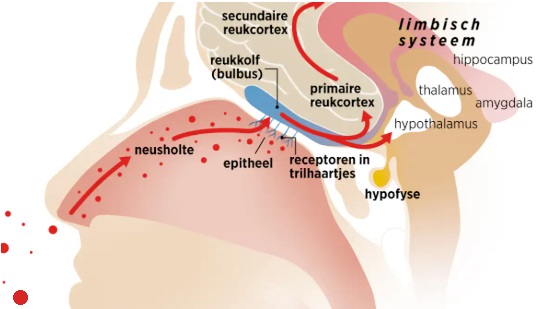odour facts
THE NOSE – WHAT DO SCENTS DO?
When we talk about the sense of smell, we also need to take a look at the organ itself. The nose is important for breathing, as it warms the air for the lungs and filters out impurities. At the top of the nasal cavity lies the actual sensory organ.

We can only smell substances that float in the air as a gas or vapor. Odor perception occurs because scent molecules dissolve in a mucus layer and are recognized by special sensory cells. These receptor cells work specifically for a certain scent, so we have a limited number of cells to smell a rose, for example. It also means that there is a limit to what we can smell. When overloaded, we even stop smelling and can no longer detect the scent that is so abundantly present.
Fascinating Facts
Smelling with the nose and tasting in the mouth are inextricably linked. When we have a severe cold, it’s no longer possible to taste things properly. We say: Tasting = Smelling + Tasting.
The sense of smell is useful for assessing food and warning us when something is wrong. It is the ‘oldest’ sense and is closely related to our deeper emotional life, such as instincts and fears. Scent can subtly influence our emotions. A few examples:
American research shows that buying a house is stimulated by the presence of the smell of freshly baked bread.
The famous Japanese work ethic is partly due to many companies spreading lemon oil and other stimulating scents through the air conditioning early in the morning.
In the Paris metro, pine scent is spread in some areas to help passengers relax.
Description of Scents
Scents can only be described in terms of scents you already know. Suppose you had to explain the smell of a rose to an alien; you wouldn’t get far. Floral, sweet, honeyed would only raise more questions. You need direct experience to exchange about it. Just as sound can be explained in pitches and lengths, and light as combinations of different colors with their own intensity, people have tried for centuries to describe scents logically. An interesting system is the one below, which is widely used in the world of perfume. It’s fun to see how nutmeg, a sheep, or kale smell.
- Floral, sweet
- Fruity, juicy
- Ethereal, fresh
- Grassy, green
- Spicy, aromatic
- Woody, hard
- Earthy, rooty
- Balsamic, resinous
- Burnt, smoky
- Fusel-like, oily
- Waxy, greasy
- Animalic, warm
The Human Response to Scent
Much is said about the magical influence of scents on human behavior. This is often compared to the animal world where dogs sniff each other to identify friends or foes, or moths that can detect partners from a kilometer away. Similar mechanisms are assumed in humans, involving so-called pheromones.
Pheromones
A pheromone is a chemical messenger that conveys messages between individuals of the same species. (Wikipedia)
The most well-known example is probably that of a group of women living together for a few months. Their menstrual cycles synchronize, causing all the women to menstruate at the same time. Various properties are attributed to pheromones; when you apply them, you become irresistible to the opposite sex! What do you think of the following advertisement:
“Alter Ego For men with three human pheromones”
Alter-Ego is the first product of its kind that contains not just one or two pheromones, but three -3- human pheromones carefully blended in an oil base to create a scent that women simply cannot resist!
It has been found that Alter Ego is an exceptionally stable product that delivers more consistent results than most other pheromone products. This means that the effect it has on someone today will generally also be invoked tomorrow, the day after tomorrow, and so on. When it produces a desired result with another person or group of people, you will particularly appreciate being able to recreate the same result whenever you want.
Source: We can barely take these stories seriously, although it is tempting to want to believe them. However, the significance of pheromones for the human species is small compared to the animal world:
Over the centuries, the cultural significance of scent has diminished, especially in the Western world where it is often about preventing or masking unpleasant odors. For us, scent has become a subjective matter; just imagine if a dog finds something smelly, for him, scent is like sight and you simply perceive it! There are still cultures that find scent important. When saying goodbye to a beloved friend, some Papuans in New Guinea press their hands under the other’s armpits and then rub their hands on their own body. It’s as if they are taking a photographic impression of the other’s scent.
In addition to the fact that we are culturally less attuned to scent, we are also less endowed than animals in terms of the organs necessary to perceive pheromones, which are only rudimentarily present in the nasal cavity—much like how we still have an appendix or a tailbone. This concerns the so-called vomeronasal organ, which is located in front of the actual olfactory organ in the diagram. Humans, and many other mammals, have a small canal running through the palate behind the front incisors that allows them to absorb pheromones effectively. However, in humans, the actual organ is barely discernible, unlike in, for example, horses or cats.
Parallel to the reduced perception of scent, there is a decreased production of scent. We are referring to the so-called apocrine glands, which, for example, gorillas or chimpanzees have spread over their entire bodies, secreting pheromones. Around the nipple, we still have such glands, helping a newborn baby to easily find the nipple. Only around the genitals and the armpits do we still have some of these glands. The influence of pheromones on humans is often overestimated, and miracles like the one suggested by the above advertisement will certainly not happen in that way. The real miracle is probably the astronomical profit that this company will make thanks to the gullible attitude of the buying public. Alter ego…..
What do scents actually do?
Scents influence our consciousness and are quite capable of bringing us into a certain mood. They don’t force but invite. And it is certainly true that lemon is uplifting, making it pleasant to smell while you’re working. It might even improve the quality of your work. Or that jasmine is relaxing and nice to smell before going to sleep. But that doesn’t mean that smelling lemon makes you work or jasmine makes you sleep. Scents add extra value to the world, even though we may not be very aware of it, but it’s a fact that people who have lost their sense of smell for some reason are at a higher risk of developing depressive symptoms.
Scents can be invaluable, but the real work must be done by ourselves.
